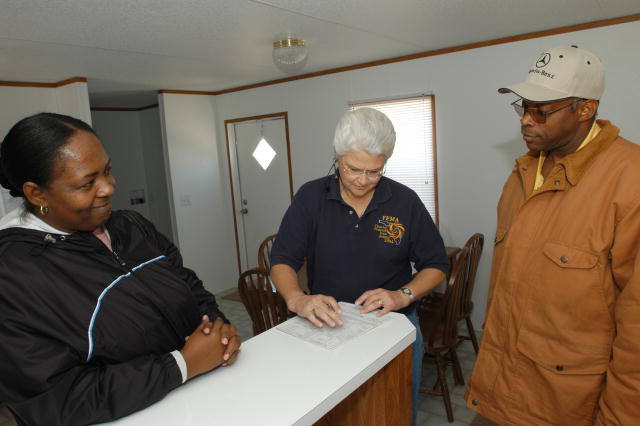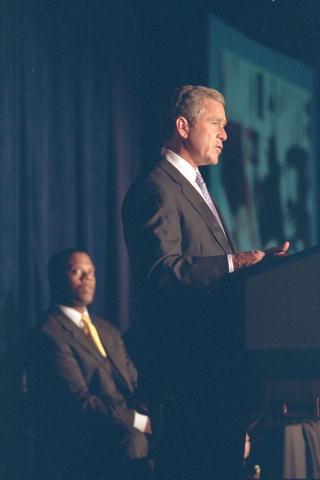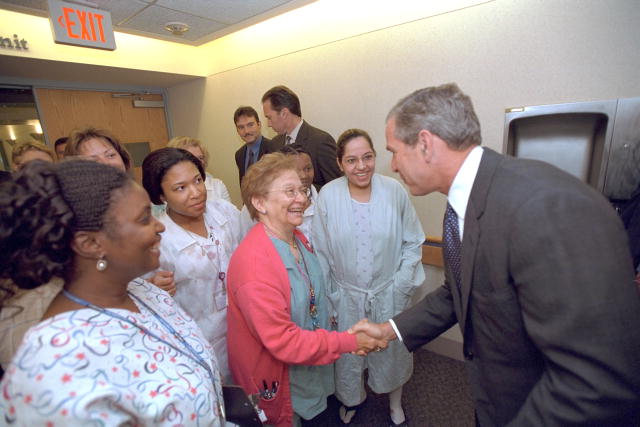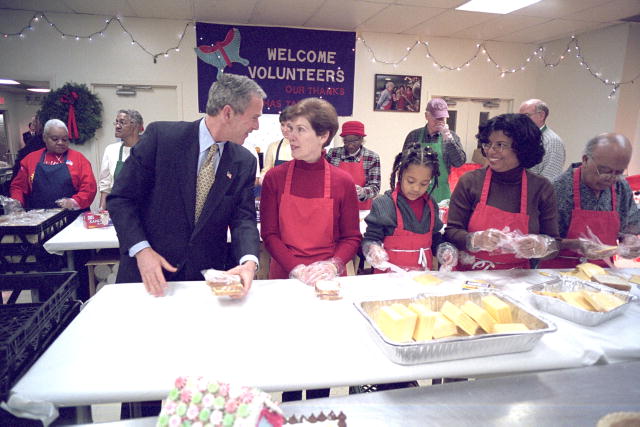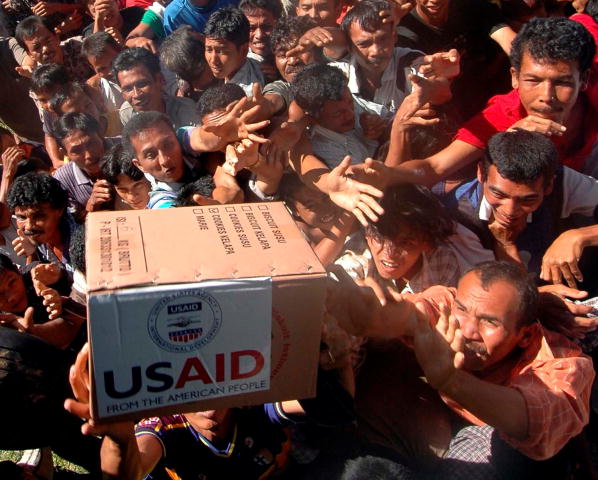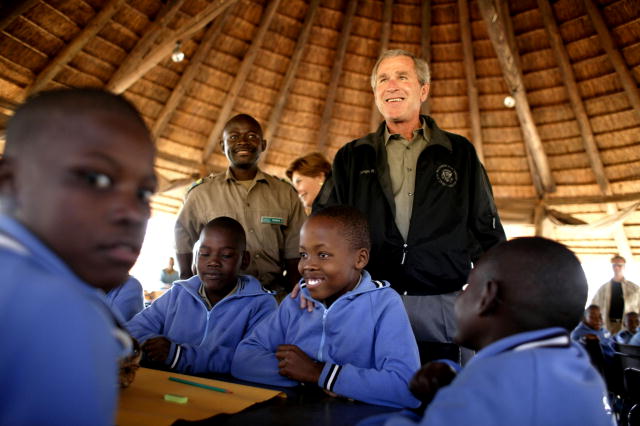 Skip Main Navigation
Skip Main Navigation
| ||||||||||||||||||
| White House Website | ||||||||||||||||||
SUPPORTING A COMPASSIONATE SOCIETYAmerica's great strength is found in the armies of compassion who comfort the sick, honor the aged, welcome the immigrant, protect the weak, mentor the at-risk, and bring healing to those who suffer from addiction. America is a prosperous country, and Americans are generous and caring. President Bush has placed a special emphasis on proposals that build on these efforts, and on working with the tens of thousands of Americans whose charitable and volunteer organizations, and community- and faith-based groups make America a more compassionate and hopeful place.
One of the efforts central to the President’s support for the compassionate spirit of America has been his establishment of the White House Office of Faith-Based and Community Initiatives. This office is dedicated to helping faith-based and community groups participate in Government-supported social service programs that help Americans escape poverty, hopelessness, addiction, and despair. One of the most useful tools in this effort has been the Compassion Capital Fund, which was created in 2002 to provide critical infrastructure and technical assistance to faith-based and community organizations. The fund has been used by these groups to provide social services, expand their good work, and find new funding sources. Since 2002, a total of $149 million has been granted to more than 300 organizations and sub-grants were given to more than 3,000 grass-roots organizations. Together with faith-based groups and other partners, the Federal Government is improving the effectiveness and reach of federally-sponsored social services, including: disaster relief, home loan assistance, hunger programs, shelter for the homeless, and addiction recovery efforts. Faith-based and community organizations are playing greater roles in assisting Federal agencies and State and local governments to help those in need. More than 20 States and more than 100 cities established faith-based and community offices, a clear endorsement of the work done by faith-based and community organizations. During his first term, President Bush challenged Americans to dedicate at least two years, or 4,000 hours over their lifetimes, to volunteer service. He created the USA Freedom Corps office at the White House to help Americans find ways to answer his call. He has also supported increased funding for service programs such as the Peace Corps and AmeriCorps. These efforts contributed to a significant increase in American volunteerism: an additional 5.7 million Americans gave time to public service during the two-year period ending in September 2004. Government funding can help promote lives of dignity and promise. The 2006 Budget's pursuit of compassionate goals can be seen in four areas: supporting America’s families and communities; promoting accessible health care; providing shelter; and upholding our values in the world. Supporting America’s Families and Communities
The American family remains one of our Nation's greatest strengths. The 2006 Budget supports families in several ways. The Administration promotes healthy marriages and strong families through programs that help fathers and mothers develop parenting skills and encourage community- and faith-based organizations to support families. The Budget proposes to direct $240 million in mandatory funds to new efforts to support healthy marriages and responsible fatherhood. Of this amount, $100 million, plus dollar for dollar matching contributions from States, would fund competitive grants for States, territories, and tribal organizations to develop innovative approaches to promote healthy marriages. The Budget includes $100 million for research, demonstration projects, and technical assistance, primarily focusing on family formation and healthy marriage activities. To support these programs, funds would be redirected from the Temporary Assistance for Needy Families High Performance Bonus ($100 million) and the Illegitimacy Reduction Bonus ($100 million). In addition, the 2006 Budget provides $10 million in discretionary funds to increase support of community-based maternity group homes, where young, pregnant, and parenting women can receive access to faith- and community-based coordinated services. More than 25 million children live in homes without fathers. In response to this problem, the Administration proposes to create a $40 million per year grant program to faith-based and community organizations to help non-custodial fathers become more involved in their children’s lives. In addition, the 2006 Budget provides support for programs that encourage responsible choices before parenthood. President Bush’s Abstinence Initiative provides grants to States and communities to develop, implement, and evaluate programs for adolescents that promote abstinence and healthy choices. Activities also advance parent education and outreach, media campaigns, and research related to abstinence education. Since 2001, 102 grantees have provided abstinence-only education services in communities nationwide. The Budget provides more than $206 million for abstinence-only activities this year. To help older foster care children make the transition to adulthood, the 2006 Budget commits $60 million to the Foster Care Independent Living Program. This program provides vouchers of up to $5,000 for education or vocational training to help youths who are close to leaving foster care develop job-related skills and lead independent and productive lives. Some families experience hardship as a result of having a parent in prison. As a group, the nearly two million children with parents in prison have more behavioral, health, and educational problems than the population at large and these children are more likely to become incarcerated. Mentoring by caring adults can improve the long-term outcomes for children whose parents are incarcerated. In 2004, the Department of Health and Human Services awarded $8.9 million in continuation grants and $37 million in new grants to programs that provide mentoring services to these children. This Budget includes $50 million for competitive grants. Since 2003, this program has worked toward providing 70,000 new mentors for children with a parent in prison. Once a parent has been released from prison, they should be given every opportunity for a fresh start. The Budget includes $75 million for the Prisoner Re-entry Initiative, which brings faith-based and community organizations together with Federal agencies to help recently released prisoners make a successful transition into society and long-term employment. Through the collaborative efforts of the Departments of Labor, Housing and Urban Development, and Justice, this four-year initiative will provide job training and placement, transitional housing assistance, and mentoring to 50,000 non-violent ex-offenders. The first grants under this program will be awarded by August 2005. One of the most pressing needs for those trying to build lives of dignity is escaping from the downward spiral of drug addiction. The Administration focuses on increasing access to effective substance abuse treatment through programs that allow those suffering from addiction to choose treatment plans that best suit their needs. Under the Access to Recovery program, individuals with vouchers may access treatment and support services from a range of providers, including faith- and community-based providers. The Access to Recovery initiative offers a flexible approach to a difficult problem—and the 2006 Budget supports this effort by including $150 million, which will sustain the existing 15 grants while expanding access to additional States or tribal organizations. States will hold providers accountable for results and reward those providers most effective at helping individuals to recover from addiction. Promoting Accessible Health CareAmerica’s health system provides high-quality, leading-edge care to those who need it. But rising costs can put health care coverage out of reach for many Americans, imposing a burden on families and businesses. That is why the President's health care policies focus on making health care more affordable and accessible, especially for low-income Americans.
Despite the availability of health care coverage through Medicaid and the State Children’s Health Insurance Program (SCHIP), millions of eligible children in lower-income families have not enrolled. The 2006 Budget proposes Cover the Kids, a national outreach campaign that will provide $1 billion in grants over two years to promote increased enrollment in Medicaid and SCHIP. By combining the resources of the Federal Government, States, schools, and community organizations, Cover the Kids aims to enroll as many Medicaid- and SCHIP-eligible children as possible. This Budget emphasizes ways to improve access to health care for Americans in need without resorting to government control of the delivery of medicine. The Budget reproposes a tax credit that will help lower-income individuals purchase health insurance and health care. This year’s proposal has been modified so that eligible individuals now have more insurance choices and can save for future health expenses. The Administration also proposes providing $4 billion in Federal grants to States to set up health insurance purchasing pools. By combining the purchasing power of millions of low-income individuals and families, these pools would offer tax-credit recipients an additional option for affordable health insurance and would make it easier and faster to shop for coverage. For those who still cannot get affordable coverage, President Bush proposes to further enhance the network of health centers that provide access to quality primary and preventive health care. Health Centers now provide care to nearly 14 million patients at 3,740 sites across the United States each year. One in six of the Nation’s low-income individuals receive health care at these sites, which treat anyone regardless of ability to pay. These centers keep patients from using more expensive care in hospital emergency rooms, and provide care when illnesses and injuries can be treated quickly and without long hospitalization. The 2006 Budget completes the President’s commitment to create 1,200 new or expanded health center sites to serve an additional 6.1 million people by 2006. Almost 2.4 million additional individuals will receive health care in 2006 through 570 new or expanded sites in rural areas and underserved urban neighborhoods. The Budget builds on the success of the President’s Health Centers Initiative by including $26 million to fund 40 health center sites in high-poverty counties that lack health centers and support more faith-based and community organizations in providing these services. The Nation’s seniors and disabled with access to Medicare will continue to benefit from the introduction of Medicare Drug Discount cards. These cards provide real savings to seniors of all income levels, and added savings to low-income seniors. Roughly six million Medicare beneficiaries have enrolled since June 2004, when the cards first became available. Independent studies have shown savings of 20 percent or more off the retail price of most brand-name drugs and 30 to 60 percent off generic drugs. In addition, over 1.7 million beneficiaries began receiving the $600 annual low-income transitional assistance. These beneficiaries can save up to 90 percent off the average retail price of brand-name drugs when they combine the drug card savings with the $600 transitional assistance. Beginning January 1, 2005, Medicare beneficiaries became entitled to new preventive benefits including screenings for diabetes and heart disease, as well as a Welcome to Medicare physical for new beneficiaries. Also beginning January 1, 2006, Medicare beneficiaries will be eligible for a voluntary prescription drug benefit. They will have their choice of prescription-drug-only plans or Medicare Advantage plans that offer a full array of physician, hospital, and prescription drug coverage. Medicare will take steps to encourage employers to continue offering drug and other health care benefits to millions of seniors. The new drug coverage will be particularly beneficial for low-income beneficiaries. Those with incomes below 135 percent of poverty will pay no monthly premium, no deductible, and very small co-payments per prescription. The 2006 Budget includes several proposals that promote home- and community-based care options for people with disabilities. These proposals build on the President’s New Freedom Initiative, which is part of a nationwide effort to integrate people with disabilities more fully into society. Under a five-year demonstration project, the Budget would pay for Medicaid services for individuals moving from institutions to the community. This would encourage home- and community-based care, which is both less expensive and more effective than the care provided in institutions. Providing ShelterThe Administration recognizes that the problem of homelessness is often tied to other major challenges: delivering mental health and substance abuse treatment to those who need it most, providing opportunities for work, and giving hope and comfort to those who are escaping abuse or neglect. The Bush Administration is working to end chronic homelessness by funding prevention and intervention programs. Research indicates that chronically homeless people may comprise less than 10 percent of the homeless population but consume over half of emergency homeless services because their needs are not comprehensively addressed. The Samaritan Initiative will provide up to $200 million in 2006 by providing housing and social services to treat the chronically homeless properly. Across the country, 46 States and over 170 localities, along with the private sector, have joined the Federal effort to move chronically homeless individuals from the streets into permanent supportive housing.
The Budget provides record resources for the Nation’s homeless. The Budget for the Department of Housing and Urban Development includes $1.4 billion for Homeless Assistance Grants, $200 million more than in 2005. The Department of Veterans’ Affairs (VA) estimates that one-third of the adult homeless population are veterans. VA’s homeless assistance programs now constitute the largest integrated network of services in the United States and serve approximately 40,000 homeless veterans annually. The Budget provides $231 million to support directly the VA’s efforts to combat homelessness among the Nation’s veterans—and an additional $1.5 billion for medical care to homeless veterans. Upholding Our Values in the WorldThe Administration supports compassionate programs overseas as well. America leads the world in providing hunger relief and medicine, as well as support and manpower to deliver aid to those afflicted by the ravages of war, persecution, natural disasters, and disease. President Bush has brought international scrutiny to human trafficking networks. And he has led a global effort to treat those with HIV/AIDS and prevent the spread of this disease, which claimed the lives of more than three million people in 2003. The effort against HIV/AIDS starts at home. Domestically, the President has requested record levels of funding to combat HIV/AIDS. The 2006 Budget requests a total domestic HIV/AIDS budget of $17.4 billion. He has also stated his support for the reauthorization of the Ryan White Comprehensive AIDS Resources Emergency (CARE) Act based upon the principles of focusing Federal resources on life-extending care; ensuring flexibility to target resources to address areas of greatest need; and ensuring accountability and results. Overseas, President Bush has launched an ambitious $15 billion, five-year Emergency Plan for AIDS Relief. Since the President announced the Emergency Plan in his 2003 State of the Union Address, the United States has provided $5.2 billion for the fight against global HIV/AIDS. The 2006 Budget requests an additional $3.2 billion for this effort. The U.S. Government has made remarkable progress during the Emergency Plan's first year of implementation. In the first eight months of President Bush's Emergency Plan for AIDS Relief, the United States supported training for more than 312,000 service providers and supported more than 14,000 sites where prevention, treatment, and care services are provided in 15 countries in Africa, Asia, and the Caribbean. Under the Emergency Plan, the Administration is committed to preventing seven million new HIV-infections; treating two million HIV-infected people; and caring for 10 million people affected by HIV/AIDS, including orphans. As part of these efforts, the United States is also working with international organizations like UNAIDS, the World Health Organization, and the Global Fund to Fight AIDS, Tuberculosis, and Malaria. The Bush Administration provided the founding contribution to the Global Fund, and the United States remains the world's largest donor.
While the United States response to the HIV/AIDS crisis is an outstanding example, this Nation has always been a world leader in providing hunger, disaster, and other humanitarian relief. When an earthquake and tsunami struck the Indian Ocean basin in December 2004, the United States led recovery efforts with a coordinated response with our armed forces deployed to the region. Assistance included food aid, medical assistance, water filtration, temporary shelter, airlift support, and long-term development assistance. The United States has traditionally been the most generous of the donor governments in providing humanitarian assistance in disaster relief, and this recent display of assistance was no different. The Department of Defense and the United States Agency for International Development conducted one of the largest relief efforts in the agency’s history to save lives, to lessen suffering, and to reduce the economic effect of the disaster. The United States, which comprises roughly 25 percent of the world's economic output, provides more than 40 percent of the world's food aid. In 2004, U.S. food aid protected vulnerable populations around the world, with more than $700 million donated to the food emergencies in the Darfur region in Sudan, as well as crises in Ethiopia and southern Africa. In 2004, the United States led the world—both in timeliness and funding levels—in assisting more than one million internally-displaced persons in the Darfur region of Sudan and 200,000 Sudanese refugees in Chad. The 2006 Budget continues this strong level of support, addressing food and non-food needs of victims of the conflict in Darfur. The 2006 Budget supports the Administration’s continuing efforts to prevent widespread famine and proposes major new efforts to make food aid more effective by requesting a portion of it as cash assistance, which allows emergency food aid to be provided more quickly and more flexibly. In 2002, the President proposed the Millennium Challenge Account (MCA) to provide new incentives for developing nations to pursue successful economic growth policies and democratic reforms. Through MCA, contributions are linked to responsible actions by developing nations. MCA rewards nations that root out corruption, respect human rights, adhere to the rule of law, invest in better health care, better schools, and broader immunization, and have more open markets and sustainable budget policies. Using funds in the MCA, the Millennium Challenge Corporation (MCC) works with eligible countries to support proposals with clear objectives to help those countries’ poorest citizens lift themselves out of poverty. While the President’s proposal has not received the funding initially envisioned, the Budget would keep it on track to reach $5 billion in annual funding by 2007. The Congress increased MCA funding from $1 billion in 2004 to $1.5 billion in 2005. The 2006 Budget provides $3 billion to help participating countries help themselves become prosperous democratic states. These investments aid our national security by helping nations avoid becoming havens for terrorists, who thrive in failed states. But these investments also respond to the humanitarian needs of people who have known only poverty and dependence. The 2006 Budget also reinforces the Administration’s commitment to finding durable solutions for the more than 12 million refugees worldwide in need of protection. The United States continues offering permanent resettlement to the most vulnerable among these populations. Refugee admissions rose by more than 80 percent in 2004. The United States is the world's largest donor to the United Nations High Commissioner for Refugees and the world's leader for accepting them . The 2006 Budget provides a funding increase of $85 million to support the growing number of refugees being resettled in the United States.
President Bush is committed to increasing American volunteerism overseas and, accordingly, has asked for increases over prior year’s appropriations in Peace Corps’ budget every year since taking office. The Administration's budget request of $345 million continues that support. Peace Corps volunteers—7,733 strong in 2004—are at their highest level in 29 years. These dedicated individuals reflect the best of American values and compassion by working in such diverse fields as education, health, information technology, business development, the environment, and agriculture. The 2006 Budget will help Peace Corps open at least two new posts and maintain the existing number of volunteers. The 2006 Budget funds the Volunteers for Prosperity initiative, coordinated by USA Freedom Corps and USAID. This program provides America’s highly skilled professionals new opportunities to serve abroad in the countries of their choice. Additionally, organizations that become Volunteers for Prosperity participants are given priority for Federal funding in select Federal development assistance programs. Since its inception, Volunteers for Prosperity has recruited nearly 200 non-profit and for-profit organizations representing a pool of 34,000 skilled American professionals from fields such as health care, business, banking, information technology, education, and public administration. These organizations have deployed nearly 7,000 volunteers to help reduce poverty and promote economic growth. ConclusionIn all these areas—supporting the family, caring for the poor and sick, protecting the vulnerable, and upholding our values—the 2006 Budget supports the efforts of millions of people who by their actions are making a difference in the lives of their fellow Americans and others around the world. In this Budget, we have focused our resources on programs that show promise and success and have shifted away from efforts that have proven less effective. We support those programs that do more than offer good intentions. They deliver results. The programs supported in the 2006 Budget serve the purposes for which they were designed. They feed the hungry, heal the sick, and save the addicted from despair. They promote caring and compassion and bring those they serve from dependence to lives of dignity. They uphold the principle that taxpayer dollars must be spent where they can do the most good for the greatest number, and that the Federal Government should welcome the participation of faith-based and community organizations in the delivery of such services. All of our efforts succeed not by the sheer size of budgets, but by the care and talent brought to help those who once seemed beyond help. | ||||||||||||||||||
| ||||||||||||||||||
